S.C. Jensen's Blog
March 11, 2022
Indie Feature Friday: YA Sci-Fi Book Review – The 716 by S.J. Pratt
It’s Friday! I haven’t done a book review in a few weeks, but I’ve got a great one for you today. I try to beta read or join the Advance Review Copy (ARC) team for as many other indie authors as I can throughout the year, and my first ARC read of 2021 was The 716 by New Zealand author S.J. Pratt!
The 716 just went live this week, which I think is the perfect time for me to rave about this fun, thought-provoking YA Sci-Fi debut.
 I made up this teaser caption, and I hope S.J. Pratt won’t mind…
I made up this teaser caption, and I hope S.J. Pratt won’t mind…  The 716 by S.J. Pratt
The 716 by S.J. Pratt
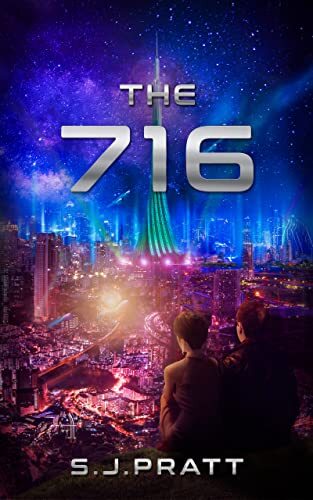 The Blurb
The BlurbA vivid coming of age story filled with feminism, engineering and the courage of everyday heroes.
Olivia is destined to be the future leader of Meliora. She’s smart, rich, and innovative, and she has a pink Identifeye light.
Andy is destined to be a waiter and househusband. His blue Identifeye light prevents him from pursuing his dream of becoming an engineer. After all, who ever heard of a male engineer?
But when Andy’s life becomes entangled with Olivia’s and he gets the chance to prove himself on the female stage, everything starts to change.
In a society where men are second-class citizens and only binary gender norms are acceptable, Andy and Olivia must confront their own beliefs and decide what kind of world they want to live in.
Will they do what is expected or what is right? And will the wrong choice spell disaster?
Fans of The Lunar Chronicles, Divergent and Noughts and Crosses will enjoy this original and thought-provoking sci-fi adventure with a touch of romance.
My ReviewI don’t read a lot of YA, so I haven’t read any of the comp series referenced in the blurb. I do, of course, read a lot of sci-fi, and I think The 716 holds its own even if we don’t call it YA.
The fact that I phrased that statement like that probably tells you that I hold some preconceived biases against YA fiction and I’m not the target audience.
To be honest, I don’t even know what YA means anymore. Is it just books with young protagonists? A way of categorizing coming-of-age novels across genres? I don’t know. I just associate the term with cheesy teenage romance novels a la Twilight and I avoid them.
Is this wrong of me? Probably.
Am I going to change? Probably not.
Unless it’s a YA book by an indie Sci-Fi writer, that is, in which case I will happily read and support and, in the case of The 716, be pleasantly surprised by the fact that all my silly notions about YA are totally wrong.
The 716 is an engaging, funny, and light-hearted sci-fi read that tackles some pretty heavy issues. I admire Pratt for taking this topic on in today’s “Culture Wars” environment where it seems like cultural divides are becoming more and more entrenched and issues of identity and discrimination are usually associated with hot-button politics rather than civil discourse. She took a risk, and I think it was well worth it.
At first, the gender swapped setting of Meliora seems a bit comical. It’s a retro-futurist vision of tomorrow with an anachronistically backward take on sex and gender. Think The Jetsons, except it’s Jane Jetson hopping in the hovercar to scoot off to work while George is stuck at home fussing over what to prepare for dinner.
It’s funny to see all the ways that Pratt has come up with to justify the notion that men are sub-par members of the human species, only good for looking pretty and occasionally lifting heavy objects. The ridiculousness is heightened because we know that women have been treated the same way and – while many of the beliefs Pratt is playing on are outdated by todays standards – it wasn’t that long ago. In fact, some of the discomfort in reading The 716 is that many of us still internalize these archaic messages, and being forced to confront them in inverse creates a kind of dissonance that, for me, lingered after I finished the book.
The main plot of The 716 is a fairly standard boy-meets-girl type coming of age set up. Olivia and Andy have to figure out who they are and whether or not their friendship is viable in a world that doesn’t approve of Andy’s refusal to bow to gender expectations. Olivia has to fight a lot of social conditioning in order to accept him as an equal. And then they have to figure out how they’re going move forward, together or apart?
There’s a hint of romance in the air, but for the most part their relationship is about friendship and the mutual respect of intellectual peers.
But the most interesting part of the novel, for me, was the relationship between Oliva and her mother (and where this is going to go in future books as Olivia becomes more comfortable pushing against authority) and the stories of the marginalized male and non-binary characters.
The most uncomfortable part of this book, for me, was actually that by flipping the gender roles to critique the way our society still treats women as second-class citizens it effectively reinforces a lot of the gender norms Pratt appears to be pushing back against: the only completely likeable characters and the heroes end up being men, one of the main characters is a man who – despite all his disadvantages and lack of education – still manages to be smarter than most of the women, there’s an air of frivolousness to the world that seems to imply that women can’t really be taken seriously as leaders.
It becomes difficult to distinguish between ones own biases as a reader and the statements about gender being made in the book. For example, I found it weird that powerful political figures in this world wore dresses with cute animal prints on them, little whales or pink leopard spots. Do I feel that clothing choices of these women are silly and a bit childish because they actually are? Or is that something I’m carrying over from real life notions about women and femininity and forcing them onto this fictional world? The lines become blurry.
I understand the choice to present a very clear gender binary in this setting (Pratt does include non-binary characters to show that she’s thinking beyond the binary even if the society of Meliora is not yet) but I feel it’s a bit too imbalanced to be realistic. There are no male characters who have any negative traits, and only two female characters who show any hope of not being completely beyond redemption.
I hope that this is because book one is just the set up for a much deeper exploration of these themes to come. I hope that we will see male characters who demonstrate the same negative characteristics that the female characters do, and vice versa. I hope that we will see a rebellion that encompasses, male, female, and non-binary people taking action to achieve a more balanced, fair, and equitable future for these characters.
And I think Pratt is leading us in that direction, even if The 716 left me wanting to see a bigger change and more development and growth in this society. I look forward to reading the other books in this series and I hope we won’t have too long to wait!
Overall, I think this is a deceptively simple premise that could turn into a complex and in-depth exploration of our beliefs about sex and gender and I’m very curious to see where Pratt takes this story!
I recommend it to readers looking for a unique introduction to approachable science fiction, and YA readers who are looking to explore a more sci-fi setting with culturally relevant issues. And to anyone looking for a light, easy read with great emotional stakes and some fantastic characters (and baddies).
DiscussionDo you read YA? What’s your favourite YA book? Maybe I’ll become a convert yet…
February 11, 2022
Indie Feature Friday – Cyberpunk Book Review: Heart Threaded by James L. Graetz
Look at this! A heart-themed cyberpunk book just in time for valentines day.
If “love” isn’t a theme that immediately pops into your head when you think of the cyberpunk genre, you’re not alone.
But author James L. Graetz manages to pull it off with this retelling of the classic tragic tale, Romeo and Juliet.
Shakespearean cyberpunk?
It gets curiouser and curiouser… Heart Threaded is an indie debut you won’t want to miss!
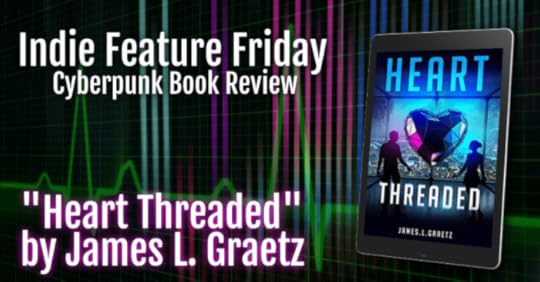 Heart Threaded by James L. Graetz
Heart Threaded by James L. Graetz
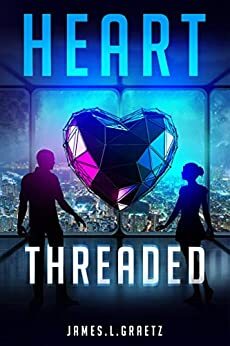 The Blurb
The Blurb
How many heartbeats would you swap for upgrades that will give you a longer more empowered life?
How many heartbeats would you swap to cure your deadly illness?
Heartbeats are currency and high tech implants can extend your life. But the price is future heartbeats. Juliet, discovers that Romeo can hack heartbeat debts and set you free.
Juliet’s father runs the city selling high tech upgrades for heartbeats.
Juliet goes behind her fathers back to see Romeo about a multiple lifetime heartbeat debt.
Romeo offers to help Juliet. Juliet sets his world on fire, literally.
He will never be the same.
Juliet must decide between her loyalty to her father and helping Romeo hack the new tech of the Heart Threads.
They are on a collision course of adventure, dragging in their friends, Tarx and Sura, together they may spark a revolution in a dystopian world.
A fast paced Romeo & Juliet story theme in a dystopian cyberpunk world.
No matter how many heartbeats, you only have one death.
My ReviewI must admit the idea of a cyberpunk retelling of Shakespeare’s famously tragic love story tickles my little Lit-majoring heart. Mismatched genre/story mashups are one of my favourite things ever, and Graetz does not disappoint.
Though Heart Threaded is only loosely based on the plot of Romeo and Juliet, the themes that run throughout the story more than justify the use of the star-crossed lovers names. Graetz’s story completely stands on its own, and some might say it wasn’t necessary to name the main characters after Romeo and Juliet, but I actually found that this little detail really added something to the story for me and I’m glad he made this choice.
To be honest, I wouldn’t have probably been inclined to pick up a cyberpunk love story on its own.
But a cyberpunk love story that I am pretty sure will end tragically??
Yeah, okay, sign me up.
In Heart Threaded, the rift between Romeo and Juliet’s world is less about family feuds (though there is a bit of that) and more about class.
Juliet is the heir to the largest and most powerful corporation in the city, called Mux Corporation, which is responsible for a new technological upgrade which gives the wearer an indefinitely extended life… in exchange for future heartbeats. It’s a wonderfully sinister take on indentured servituded, and a strong warning against indebting oneself for the sake of the the latest and greatest techno-toy.
Romeo is a hacker, famed in the underground for his ability to eliminate people’s heart-debts. But when Mux Corporation upgrades the old heart stones to the new, unhackable heart threads, Romeo finds himself in a tough position.
Because Juliet seeks him out to help save someone dear to her, and when they meet, worlds collide.
What follows is a fast-paced and heart-wrenching tale of sabotage, treachery, and violence from both Juliet’s power hungry father and the rage-filled disenfranchised inhabitants of the undercity.
Both Romeo and Juliet are eminently likeable protagonists, and I was rooting for them the entire time (although I knew it couldn’t end in roses for them) which helped add to the tension.
Graetz use of theme was very strong in this novel, and he handled the “retelling” very well. But my absolute favourite part of this story is the undercity and his descriptions of the way the two classes of citizens live. This is cyberpunk at its rawest and most gritty, and it made a fantastic background to what might have been too-sweet a tale.
Author C.T. Phipps has said he’d love to see a sequel to this fantastic debut and I’m with him.
Romeo and Juliet’s story might be over by the end, but there’s a whole new story brewing for what they leave behind.
This is a great debut, and would be a wonderful way for people new to cyberpunk or new to indie books to dip their toes into the waters.
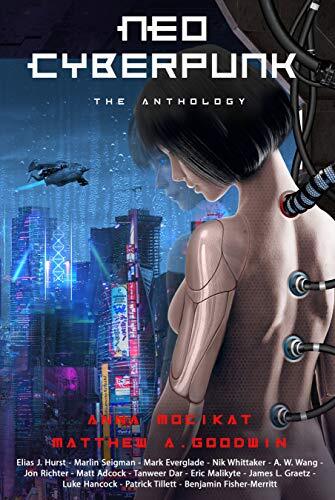
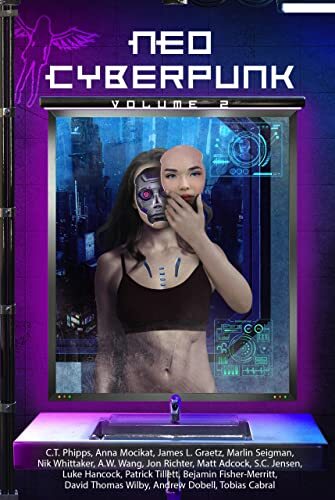
You can also check out James L. Graetz’s short stories in the Neo Cyberpunk and Neo Cyberpunk Vol. 2 anthologies. (I’ve got a story in Vol. 2 too!)
DiscussionHave you read any great retellings lately?
My own HoloCity Case Files series is based on loose retellings of Raymond Chandler’s short stories.
February 4, 2022
Cyberpunk Book Review: Headcrash by Bruce Bethke
Earlier this week I talked about Bruke Bethke’s 1980 short story “Cyberpunk” that gave our favourite genre its name. You can read the blog post here and read the story here.
Today, I want to tell you a little bit about Headcrash, Bethke’s 1995 novel that won the Philip K. Dick award that year.
Before you dive into the review, you might want to jump back to the previous post that gives a bit of history on Bethke’s experience in the genre.
 Headcrash by Bruce Bethke
Headcrash by Bruce Bethke
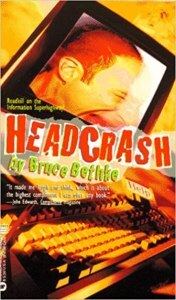 The Blurb
The BlurbWhen Jack Burroughs, a brilliant young computer programmer, is given his pink slip, he is offered the opportunity to use his skills for a little industrial espionage. Donning the guise of his online alter ego, Max Kool, Burroughs transforms himself into one of the hippest cybernetic surfers on the InfoBahn.
“Bethke has taken the computer industry and thrown it in a blender . . . savagely funny”.–“Seattle Weekly”.
The ReviewI picked up this book without actually knowing anything about it except that Bruce Bethke had written it.
I learned this when the man himself joined a Cyberpunk Groups book that I moderate with a bunch of other indie cyberpunk authors. (Many thanks to Behind Blue Eyes author, Anna Mocikat, for the introduction! I reviewed her book here.)
In his into post, he explained about his infamously named short story and his wish that people would pay more attention to his award winning novel rather than the “Cyberpunk” novel that would never be. If you don’t know the story, you can read about it here.
Now, beyond being a bit star struck at actually having a conversation with one of the most influential–if somewhat unknown–writers in the genre, I was curious about Headcrash.
How does a cyberpunk book win a Philip K. Dick award and not end up one of the most read cyberpunk books in the genre? Bethke has served as one of the judges for the award in years since and is the editor of Stupifying Stories magazine’s anthologies, which is well recognized in the SF&F writing community as being a stepping stone publication for many famous authors.
The fact that Headcrash didn’t make more waves is a bit… well… stupifying in itself.
When I read it, though, I began to understand why. But it’s not for the reason you might think.
Headcrash is bloody fantastic.Let me get that out of the way first, because I know some people are going to assume that the simple reason Headcrash hasn’t become canonical to the genre is that it sucks. It doesn’t.
Like Bethke’s “Cyberpunk” story, the writing is eminently readable, unlike the more cryptic prose of Gibson’s Neuromancer. And Bethke has real chops in the the tech industry. As one of his author bio in and interview with Strange Horizons magazine states:
“What very few people in either circle have known until recently is that he actually works in supercomputer software development, and all his best science fiction gets repackaged as “futurism studies” and sold at stunningly inflated prices to various government agencies, where it is promptly stamped SECRET and filed away, never to be seen again.”
Strange Horizons magazine
Gibson readily admits that he isn’t a techno-whiz himself.
“I’m not a computer guy,” he has been quoted. “I’m like an anthropologist. I’m fascinated with people’s obsessions. I’ve learned to wear them.”
Neuromancer is often described as closer to science fantasy than hard sci-fi, and I’m inclined to agree. This isn’t a dig at Gibson, either, I appreciate an author who doesn’t let facts get in the way of a good story. Often technologically accurate and detailed narratives read more like manuals than novels.
So it is doubly impressive that Bethke is able to apply what he knows about software and technology in the real world and make it readable to a techno-moron like me.
I’m obviously not able to vet the plausibility of his fictional technologies, but what I will say for Bethke is that he is able to describe his tech in a way that makes sense. Frankly, I don’t think this is something Gibson ever achieves, but which people forgive him for because handwavium is part of the mystique of his stories.
But do you know why I think Bethke’s writing hasn’t taken off?
Headcrash pokes fun at the cyberpunk genre.It’s a parody. It’s a bitingly satirical take on all the overdone tropes of the genre. It’s akin to the wonderful genre spoof movies of the 80s like TOP SECRET! and Cry Baby. But it has that 90s vibe and acerbic tone that could have been a Kevin Smith project.
I loved every minute of it. I laughed out loud repeatedly and read sections to my husband because he wanted to know what I was giggling about.
Headcrash is cyberpunk for fans of the genre who don’t take themselves too seriously.
And that’s the problem.
There aren’t many.
As a genre, cyberpunk takes itself very seriously. The endless, ornery ranting about what is or is not “real” cyberpunk in any fan group will reveal exactly how flexible the majority of cyberpunk lifestyle enthusiasts are in their genre dogma.
And because Bethke is relatively unknown despite his massive influence, I believe a lot of fans read Headcrash as if he was an outsider looking in and teasing about the things they love.
Unfortunately, the real outsiders didn’t get it either.
According to critical reception, there were a lot of people who didn’t even understand that it was meant to be satirical. These are the people who didn’t know the genre well enough to understand what was being parodied.
And so Headcrash is an absolute cult classic for a fringe minority of cyberpunk enthusiasts who have a sense of humour about their favourite genre.
What makes Headcrash so great?Well, that’s a matter of opinion, of course.
I love humour writing, and it is probably the hardest type of writing there is. People’s senses of humour are vast and varied, and what tickles the funny bone of one group is going to annoy another.
I guess I’m the right reader for this book, because I loved it the same way I loved the cheesy 80s spoof movies.
It’s corny and a bit slapstick, not afraid of throwing in a few cheap laughs for the peanut gallery.
But underneath it all, there is a love for the genre and an inherent understanding of what makes cyberpunk books so great.
Even though Headcrash is a parody, and I knew it was a parody, I was still riveted by the the actual cyberpunk plotline and I was rooting for poor Jack Burroughs all the way.
Knowing Bethke’s history with the genre, and the way he was (I believe) essentially cheated out of his opportunity to capitalize on the success of his original “Cyberpunk” story, adds a bittersweet edge to the satire.
If anyone has earned a right to poke fun at the genre, it’s Bruce Bethke.
DiscussionI’m a big fan of humour in every genre, as those who have read my Bubbles in Space series can attest to. I wouldn’t say I write comedy, but I like to keep things light, even when there are dark themes lurking in the corners.
Do you have a favourite satire or parody novel?
Hit me with your suggestions!
February 1, 2022
SF Themes and Ideas: Where does the word “Cyberpunk” come from?
You’ve heard the word. You might even think you know what it means.
The definition of cyberpunk, however, is an ephemeral and ever-changing thing which refuses to be pinned down. It is generally accepted that cyberpunk is a genre which explores dystopian futures, warning of the downsides of humanity’s unmitigated embrace of technology. Stylistically, there is a kind of neo-noir flare to the bleak high-tech cityscapes with their rainy nights and neon lights and the inherent dichotomies presented by the high-tech, low-life. Decades after its inception, fans still love to argue about what constitutes “true cyberpunk” and what is simply dystopian “science fiction.”
Cyberpunk is a sub-genre of science fiction that gained traction in the 1980s and exploded in popularity with the dual literary and film blockbusters Neuromancer (1984) by William Gibson and Blade Runner (1982) directed by Ridley Scott, but earlier proto-cyberpunk works exist such as Philip K. Dick’s Do Androids Dream of Electric Sheep? (1968)–the novel that inspired Blade Runner–and the Judge Dredd comics which were first released in 1977.
But where does the word “cyberpunk” actuall come from?

Before Gibson penned his now-famous novel, and before Ridley Scott’s Blade Runner bombed at the box office (it has since become a critically acclaimed hit and a cult classic, but initial reactions were lukewarm at best), a writer by the name of Bruce Bethke penned a series of short-stories which he titled “Cyberpunk” in 1980.
How did he come up with the word? Bethke answers this question on his website, in a forward to the orignial story:
The invention of the c-word was a conscious and deliberate act of creation on my part. I wrote the story in the early spring of 1980, and from the very first draft, it was titled “Cyberpunk.” In calling it that, I was actively trying to invent a new term that grokked the juxtaposition of punk attitudes and high technology. My reasons for doing so were purely selfish and market-driven: I wanted to give my story a snappy, one-word title that editors would remember.
Offhand, I’d say I succeeded.
How did I actually create the word? The way any new word comes into being, I guess: through synthesis. I took a handful of roots –cyber, techno, et al– mixed them up with a bunch of terms for socially misdirected youth, and tried out the various combinations until one just plain sounded right.
Forward: Cyberpunk! by Bruce Bethke website: http://www.infinityplus.co.uk/stories/cpunk.htm
Ironically, the man who invented the term “cyberpunk” has largely been forgotten by fans of the genre, not because his story was forgettable–It’s actually wonderful, and I encourage you to read it here!–but because of the unethical action of his publisher who refused to let the rest of the stories see the light of day.
The original “Cyberpunk” story was first published in Amazing Stories in 1983. Bethke sold the collected stories as a novel to a publisher in 1989. Unfortunately, that novel was never published. Why? Because Bethke stood up for himself against the demands of his publisher to change the ending of the story.
The ControversyIn an interview with Strange Horizons in 2005, Bethke was asked about this missing novel and why it was never published after it had been sold in 1989.
“Ah, well, hindsight is 20/20,” Bethke replied. “The book was never released because the publisher hated the ending and I refused to rewrite it. What the publisher wanted me to write was a “Frazetta cover” ending; you know, the hero, center stage, with a mighty weapon in his hands, a cowering half-naked babe at his feet, and the blood-smeared corpses of his many enemies piled high all around. To get to this ending I would have had to end the book with the lead character committing a massacre inside a school—which is what the publisher specifically asked me to write—but even 10 years before Columbine, I found that idea utterly revolting. So I refused to write it. Perhaps the publisher was right. Perhaps the book would have sold well with a blood-soaked adolescent revenge fantasy ending. But sales aren’t everything.”
Bethke’s experience with this unnamed publisher is thematically aligned with the very thing cyberpunk has come to rage against: corporate control of the creative individual.
This type of behaviour from bullying traditional publishers is one of the reasons many writers today have turned to independent publishing, but in the 1980s Bethke didn’t have the same kind of options.
Ensnared in legal battles for years, Cyberpunk the novel lingered in limbo as the genre surged in popularity and Bethke lost his opportunity to participate in The Movement that had taken its name from his work. Had his Cyberpunk novel been published, the evolution of the genre might have been quite different.
Bethke went on to write Headcrash, a cyberpunk parody novel that won the Philip K. Dick award in 1995, and is currently serving as the the editor of Stupifying Stories magazine.
I will be reviewing Headcrash on Friday this week, as it is an absolute delight of a novel that I think every cyberpunk fan should read. Given Bethke’s experience with his Cyberpunk novel, the acerbically satirical tone of the novel packs an extra punch.
About Bruce Bethke
In science fiction circles, Bruce Bethke is best known either for his 1980 short story, “Cyberpunk,” his 1995 Philip K. Dick Award-winning novel, HEADCRASH, or lately, as the editor of the STUPEFYING STORIES anthology series and driving force behind RAMPANT LOON PRESS. What very few people in the SF world have known about him until recently is that he actually began his career in the music industry, as a member of the design team that developed the MIDI interface and Finale music notation engine (among other things), but now works in supercomputer software R&D, doing work that is absolutely fascinating to do but almost impossible to explain to anyone not already fluent in Old High Unix and well-grounded in massively parallel processor architectures, Fourier transformations, and computational fluid dynamics.
In his copious spare time he runs Rampant Loon Press, just for the sheer love of genre fiction and the short story form.
from Amazon
January 7, 2022
Indie Feature Friday: Cyberpunk Book Review — The New Prometheus by Andrew M. Dobell

There is nothing better than curling up with a cup of coffee or tea when it’s -46°C and hiding from reality with a good book. When it’s this cold outside, I like to pretend I live just about anywhere else.
Even a high-tech, low-life dystopian future society where I’d probably be lucky to last an hour in… because that’s longer than I would last outside today.
To those of you fortunate souls who don’t live on the the bald-ass, howling-wind, frigid wasteland of the Canadian Prairies, I commend you for your clearly superior life choices. But I bet there are things you’d like an escape from, too.
We all do. Right? Right??
Of course we do.
To this end, I offer you todays Indie Feature Friday Cyberpunk Book Review The New Prometheus by Andrew M. Dobell!
The New Prometheus by Andrew M. Dobell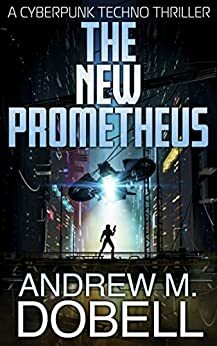 The Blurb
The Blurb
Attacked and left for dead,
she wakes up in a cyborg body,
and a corporation is hunting her down.
In world of massive inequality and slums filled with millions, society is dominated by cruel corporate rule.
Working a dead-end job, living in a dingy apartment, Frankie is always behind on rent. But knowing there are those with less, she spends her free time in the slums, helping those who have nothing.
When a Jacker Gang attacks, Frankie is shot, and left for dead.
She wakes up in a body that isn’t hers.
Her life was saved by a back alley cyber doc, who implanted her brain into a cyborg body.
Frankie has barely woken up when the corporations attack, kidnap the doctor and force Frankie to flee.
Pursued by corporate operatives, hulking mechs and deadly cybernetic agents, Frankie is lost in the slums in a body that’s not hers.
She must deal with endless attacks and find allies she can trust if she’s going to survive.
Some books are just begging to be made into blockbuster action movies. This is one of them.
Frankie is an eminently likeable character. She’s tough and strong-willed, and has a heart of gold. But she’s far from invincible.
That is, until she is shot and a back alley cyber doc transfers her brain into a massively overpowered cyborg body using tech that he designed and stole from the friendly neighbourhood megacorporation.
Frankie must save the doctor who saved her life; she might just want to strangle him herself.
I loved the parallels between this story and Mary Shelley’s Frankenstein. As a lover of literary fiction this little detail really tickled my fancy. But the comparisons between The New Prometheus and any lit fic pretty much end there.
This is a relentlessly paced techno-thriller for readers who like non-stop action, epic firefights, mech-battles, and cyborg brawls. There isn’t quite as much introspection as we find in Agent G (you can read my reviews for Infiltrator and Saboteur here!) but Frankie is a fantastic character and it’s a pleasure to see her come into her own as she transforms from a young philanthropist to a weapon of mass destruction.
I quite enjoyed the dynamic between Frankie and Detective Gibson, and look forward to seeing how this develops. The good doctor himself is a complicated character, and part of me really wants to see him get what’s coming to him… but maybe after he fixes that one little problem with Frankie’s new body (I’m not telling what it is, but I’d have killed him for it).
If you enjoyed Ghost in the Shell or Alita: Battle Angel, you’ll have a blast with Frankie as The New Prometheus.
If you’re on the fence, Dobell has two free prequel novellas available for download, so you can dip your toes into the series.

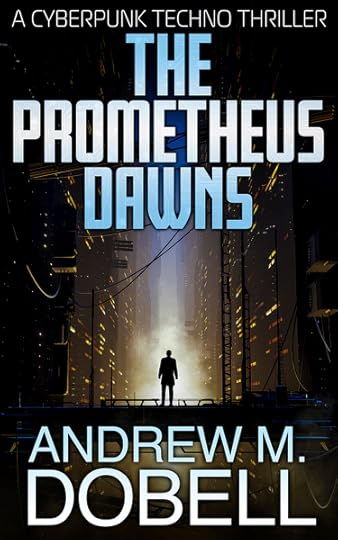
The first, The Prometheus Awakens, tells Frankie’s story before the events that occur in The New Prometheus. The second, The Prometheus Dawns, tells the back story of Detective Gibson.
In order to claim these free titles you must sign up for Andrew M. Dobell’s newsletter, but you can unsubscribe at any time, and he’s a super cool guy so you will probably want to stick around. He’s got lots of books!
All in all, this is a great cyberpunk flavoured techno-thriller and I look forward to the rest of the series. This is an older series that Dobell is currently rereleasing, so if you are a fast reader looking for a new series to binge, this is a great one to check out. A new book is being released every week until all five books are out, and they are all available in audiobook on Audible as well as Kindle Unlimited. [Note: If you sign up for your free trial using either of those links, I will get a small commission from amazon at no cost to you! It’s win-win! UK Readers click here for Audible and here for Kindle Unlimited.]
DiscussionWhat are you hiding from when you escape into fiction? Work/School deadlines? Family drama? Miserable weather? Life in general?
What are your favourite kind of books to escape into?
January 3, 2022
Cyberpunk Book Review: When Gravity Fails by George Alec Effinger

In my effort read all the indie cyberpunk books I could get my hands on this year, my foray into the classics has been a bit stilted. I’ve managed to read some proto-cyberpunk by Philip K. Dick and Larry Niven, as well as Neuromancer by William Gibson, and a few short stories, but that’s about it.
When I first looked into When Gravity Fails it really seemed to check all my happy boxes: cyberpunk, noir style, murder mystery, exotic locations… but it took me a long time to actually pick it up and read it.
Now I wish I had ordered the next to book in the series because I want to keep reading them ASAP!
This book is incredible. I loved it. I don’t know why more people don’t talk about it!
When Gravity Fails by George Alec Effinger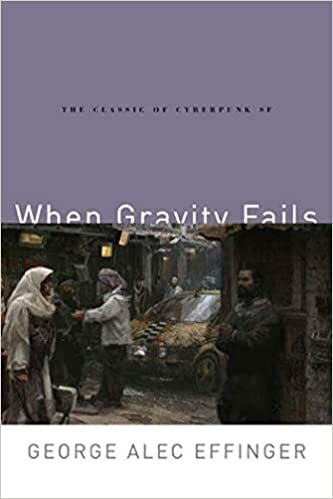 The Blurb
The BlurbIn a decadent world of cheap pleasures and easy death, Marid Audrian has kept his independence the hardway. Still, like everything else in the Budayeen, he’s available…for a price.
For a new kind of killer roams the streets of the Arab ghetto, a madman whose bootlegged personality cartridges range from a sinister James Bond to a sadistic disemboweler named Khan. And Marid Audrian has been made an offer he can’t refuse.
The 200-year-old “godfather” of the Budayeen’s underworld has enlisted Marid as his instrument of vengeance. But first Marid must undergo the most sophisticated of surgical implants before he dares to confront a killer who carries the power of every psychopath since the beginning of time.
Wry, savage, and unignorable, When Gravity Fails was hailed as a classic by Effinger’s fellow SF writers on its original publication in 1987, and the sequence of “Marid Audrian” novels it begins were the culmination of his career.
My ReviewThis book, to me, is stylistic perfection.
It is the marriage between science fiction and hard-boiled noir novels that I have always dreamed of creating some day. When I first starting writing Bubbles in Space, in the back of my mind I was trying to make something like this book. I didn’t know it existed yet, but this is what I wanted.
Bubbles in Space ended up more like a parody of this world, and it’s themes completely diverged from that of societal corruption to one of personal growth. But that’s besides the point. Stories do what they want…
And in the end it’s a good thing, because When Gravity Fails is the book I was envisioning anyway, and I wouldn’t want to have to compete with it.
Effinger’s world is rich and immersive. The setting of a high-tech Arab city was an interesting diversion from the usual focus on Asian or American city settings, and one which kept me interested. I loved the juxtaposition between Muslim traditions and spirituality and the decadence of the Budayeen.
Marid Audrian is wry and funny, with the perfect balance of noir cynicism and self-effacing humour. The crimes are brutal. The technology is absolutely stunning, despite its simplistic treatment, even reading it from a modern perspective. It holds together in a cohesive, believable way.
I really appreciate Effinger’s exploration of gender and sexuality, too. It was never central to the plot, but this is a future that really allows for a kind of fluidity of gender and sexuality that we don’t see often enough in science fiction.
My only complaint is that it relies heavily on binary expressions, and people seem locked into gendered roles in this society. The world is still on in which females (biological or otherwise) are viewed as inferior to males. (In fact, I think every significant female character in the book was once male, which makes me wonder a bit about what Effinger thought of those of us born with XX chromosomes, but that’s a thought for another time)
In many ways, the classic hard-boiled noir tropes are still in place. The femme-fatale had a sex-change operation, but once she became a woman, she never strayed from the usual female character tropes.
Still, it’s a starting point (and the book came out in 1987, so we have to give Effinger some credit here) that hasn’t been pushed past hard enough.
As a crime and mystery novel, it was fantastic. Very reminiscent of the the classics like Raymond Chandler, but with a few additional sci-fi plot twists to keep it feeling fresh and interesting. The style is definitely closer to the classic detective novels rather than newer mysteries. You aren’t really meant to solve the mystery alongside the main character, and in a sense the mystery itself is an aside to the story of Marid’s transformation. You won’t find any heroes here and, I believe, that’s the point.
In many ways, this is literary fiction masquerading as genre fiction, which is maybe why the critical reception has been a bit polarized. Still, it won a Hugo, and I think it deserved to.
I am excited to read the other two books in this series next year!
DiscussionOpinions on When Gravity Fails seem to be hot or cold. Have you read it? Did you love it or hate it? What was your favourite or least favourite aspect of the story and characters?
January 1, 2022
New Year, New Books!

Happy New Year from S.C. Jensen and Bubbles Marlowe!
2021 was an absolute whirlwind year for me as an author. I finally decided to go all in with indie publishing and set myself some aggressive writing and release goals. I managed to get out five full length novels and two novellas, along with two short stories and another novella which will be released in early 2022.
I’d like to thank all of the readers and reviewers who have supported me this year and helped to make the Bubbles in Space series a resounding success.
No, I’m not going to be able to retire on my income this year. In fact, I spent the majority of my book earnings on covers, editing, and advertising… *sad laughter*
2021 Results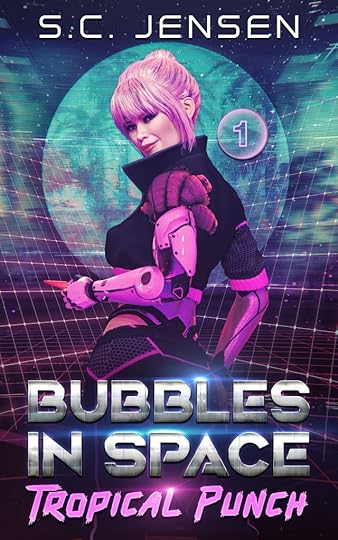


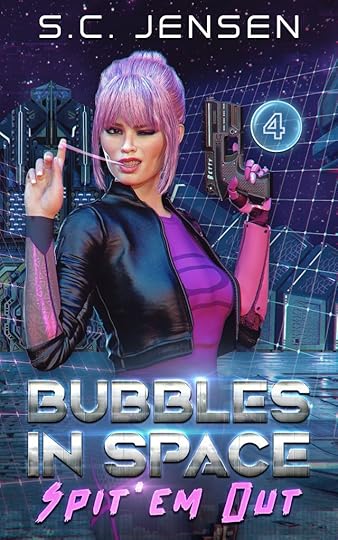

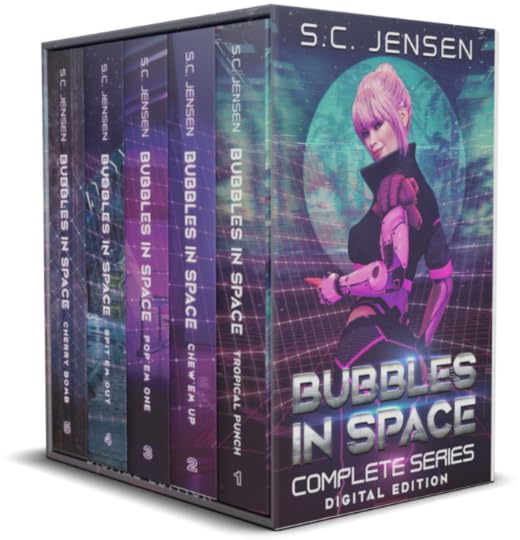
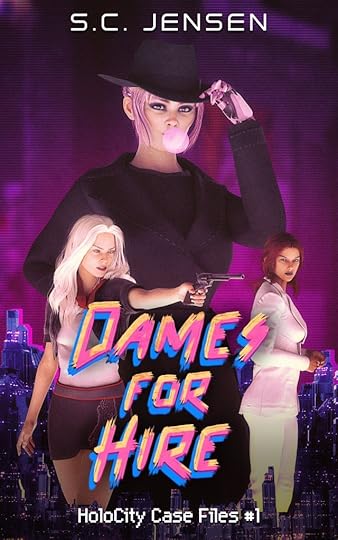

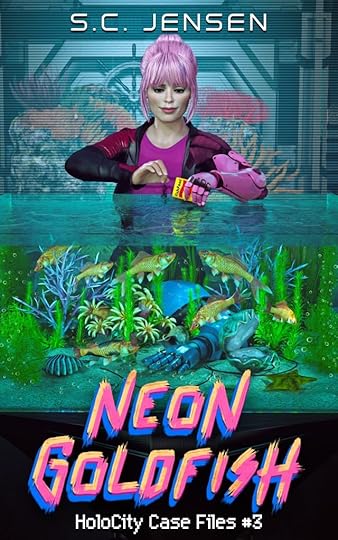
I have sold 1400 books, and had and additional 198,968 page reads in Kindle Unlimited, since the release of Tropical Punch on March 31, 2021. For an indie author without an established fan base, that is a phenomenal first year!
Did you know that many books, including those published by major publishing houses, never sell more than 1000 copies? Not per month, not per year, but in their lifetime? Relatively successful traditional books often only sell 5000-10,000 copies in their lifetime. (Never mind those bestsellers that sell this many every day, there aren’t that many of them and they tend to skew the results.)
I’m not anywhere near those numbers yet, but for less than a year in the field I’m feeling like I’m off to a strong start. If you are an indie author and are looking for some hard numbers, here’s what I sold in 2021.
Tropical Punch (Bubbles in Space #1) sold 709 copies in nine months.
Chew ‘Em Up (Bubbles in Space #2) sold 307 copies in seven months.
Pop ‘Em One (Bubbles in Space #3) sold 160 copies in five months.
Spit ‘Em Out (Bubbles in Space #4) sold 79 copies in three months.
Cherry Bomb (Bubbles in Space #5) sold 40 copies in one month.
Bubbles in Space (Digital Edition Boxed Set) sold 15 copies in 10 days.
Dames for Hire (HoloCity Case Files #1) sold 82 copies in nine months. [Note: This is my reader magnet, which I give away for free when people join my mailing list, which is why this number is so much lower. There were 82 people who chose to buy it instead.]
HoloCity Hard Boys (HoloCity Case Files #2) sold 8 copies in 1 day (It just came out yesterday, so it’s not really of interest yet, but it was a part of my total sales for 2021.)
The Hard TruthGetting and staying visible in an industry that has thousands of new books and new authors being pumped into it every day is a challenge. It requires either a lot of time and social media know-how to leverage free promotional sources and fan groups and/or a lot of money to throw into advertising on Amazon, Facebook, and other major outlets.
Bubbles in Space grossed $3280 USD in 2021. That’s great! But I spent almost all of that on ads to get there.
The good news is, I’ve learned a lot about how ads work and how best to market my series going forward. The bad news is, I didn’t actually make any money on my books this year.
Please don’t let this discourage you! One of the reasons that I spent so much on ads was that I’m writing in a very small, hard to target niche. Many authors who have done a better job at writing to market in a larger niche do much better with much less ad spend.
You do not have to do it the way I did. I decided to invest into building my readership because I set aside money specifically for this before I started. I actually don’t plan to make much money for at least 3-5 years.
Looking ForwardBubbles in Space will always be my passion series. I absolutely love it and my readers love it and I look forward to growing this world! My next projects are going to attempt to broaden the appeal of this series by reaching two larger genres, namely Space Opera and Techo-Thrillers.
I hope to learn from the mistakes I made this year and make 2022 an even bigger success than 2021.
Maybe I’ll even get to keep some of that book revenue…
And indie author can dream, can’t she?
DiscussionIf you are an indie author looking for insights into the business, is there anything that you would like to know? Please ask! I will be as transparent as I can (I’ll have better numbers once I do my taxes).
December 31, 2021
Indie Feature Friday: Cyberpunk Book Review — Agent G: Saboteur by C.T. Phipps

Greetings, book lovers! I hope your holiday time has treated you well and that you’ve had lots of quiet time to relax and read.
With the kids home from school for a couple of weeks, I have had nothing of the sort! But I will live vicariously through you…
I have gotten lots of reading done, but I’ve had to be selective about the kind of books I read. I need fast paced, action-packed thrillers that have me so invested in the lives of the characters that I physically cannot be interrupted, even by the most persistent cases of “Mom, I’m hungry!” or “Mom, she’s breathing my air!”
If you, too, suffer from these kinds of interruptions… I give you C.T. Phipps’ Agent G series!
I’ve already reviewed Agent G: Infliltrator (Agent G #1) and loved it. You can read my take here.
I was excited to start the next book in the series after the first one had me on the edge of my seat, and Phipps does not disappoint.
Agent G: Saboteur (Agent G #2)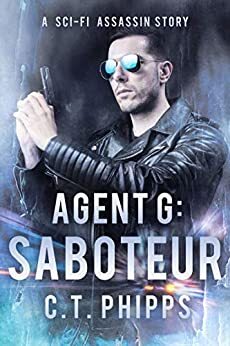 Cyborg James Bond? Yes, please…The Blurb
Cyborg James Bond? Yes, please…The BlurbFrom the best-selling author of the Supervillainy Saga comes the sequel to Agent G: Infiltrator.
Agent G has left the service of the International Refugee Society, the world’s biggest provider of murder for hire, in order to work for the US government. Unfortunately, they are sending him after his former employers, and they know him as well as he knows them.
The clock is ticking, though, until the Society’s remaining leadership starts eliminating their opponents and attempts to seize control of the presidency. A traitor is also providing them with all the information they need to survive until their puppet is in power.
Will G and his allies survive the purge?
Sometimes it doesn’t pay to be a cyborg spy.
My ReviewI absolutely loved the first two Agent G books, and have already downloaded the third and final book in this series for my January reads.
This is an action-packed spy thriller series with a sci-fi twist, full of political intrigue, lies, double-crossing, lies and more lies.
Did I mention the LIES?? I’m practically traumatized by all the betrayals in this story. And yet, here I am, itching to start Book 3…
The plot is relentlessly fast-paced. I loved that I never knew what was going to happen next, but none of the twists felt like cop out, deus ex machina type devices. Phipps does a great job of laying the groundwork so that everything that happens, as wild and crazy as some of it is, feels true to the plot and the characters.
The characters, by the way, are my favourite part of these books. There’s a great dynamic between all of the various people who have worked for, betrayed and been betrayed by the Society and the American government. Everyone has their own agendas, but there are strong interpersonal connections that keep each of them from being predictable. I loved the banter in this one, just like book 2, and I especially loved the depth of thought that Phipps has put into these characters and their relationship to their world.
The setting of this story is a kind of pre-cyberpunk. Phipps offers up some speculation as to how our current world might devolve into the cyberpunk dystopias we love (and love to worry about). He also tackles a lot of themes that I believe are integral to the genre, including questions about what make us human (do memories make the man? can our actions redeem us?), how an android or cyborg might approach spirituality, how technological disparities could be our undoing, etc.
Again, like Book 1, you can really approach this series with as much or as little introspection as you like. There is more than enough action and adventure and one liners to keep you entertained if you just want an exciting way to spend a few hours. But if you want a book that makes you think, Phipps gives us plenty of things to ponder.
Fans of classic spy thrillers who are looking for a fresh take on some old tropes will absolutely love Agent G. Likewise, science fiction fans who are looking for a departure from space ships and aliens but still want lots of high-tech intrigue, look no further!
I had a blast with this book and highly recommend C.T. Phipps as an indie author to keep your eyes on. He also has a bestselling super-hero parody series, The Supervillainy Saga which is worth checking out if you like quirky urban fantasy, pop-culture references, and hilarious shenanigans.
DiscussionWhat have you been reading this month?
December 17, 2021
Indie Feature Friday: Cyberpunk Book Review – Ten Sigma by A.W. Wang

I’ve got a gruesome one for you today, if you’re a sci-fi AND a horror fan.
I just read an incredible indie cyberpunk novel, and it is not for the faint of heart. Read on if you dare…
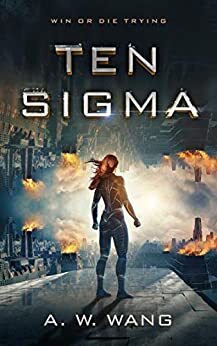 Ten Sigma by A.W. WangThe Blurb
Ten Sigma by A.W. WangThe BlurbIn future America, the downloaded consciousnesses in the Ten Sigma Program fight endless battles. The struggles span all possibilities: face-offs with knives and clubs, skirmishes as Roman legionaries, pitched WW1 trench warfare, duels with ultra-modern hypersonic weapons, and everything in between.
The combatants who live are rewarded with another battle until they reach the unreachable score of ten sigmas. Those who die are expunged from the system, gone forever. The methods, so harsh they go beyond anything possible in the real world, are necessary for the end goal: violent evolution to produce the greatest warriors in all of human history.
Who would choose such a fate?
Those with no hope.
On a wintry night, a government representative presents Mary, who is dying of incurable cancer, with the offer: a second chance at life and for those completing the requirements, a return to the real world in a fresh, healthy body. To save her family from bankrupting medical bills, she accepts.
After her consciousness is transferred into the virtual universe of the program, her essence is ripped apart and her memories shattered. She’s reassembled as the perfect killer.
As the life-and-death contests begin, she discovers the true nature of what lies ahead. But, she won’t surrender to the impossible and grimly embarks on the journey to return to her family while trying to save her soul.
This series is billed as a Military Sci-Fi Adventure, and it certainly is that. But I’m including it in my “cyberpunk” book reviews, because I think its got a lot of the relevant themes in place.
That, and a dash of holy sh*t batman what did I just read?!?
When I finished this book, I closed my kindle and just set it aside for a second with my mouth hanging open like an idiot. It was a wild ride.
Is it cyberpunk? Yes, but it almost doesn’t feel like it because so much takes place in a simulated training environment. Wang shows of his knowledge of historical warfare with battle scenes spanning centuries and cultures from around the globe.
Now, I have to admit, I usually hate reading lots of action scenes back to back. My eyes glaze over when authors describe endless blow-by-blow combat scenes. And yet this book kept me completely riveted.
Why?
First, while there are countless fight scenes, each one is completely different with unique goals and challenges, so it never feels like too much. Second, the character development is so exquisitely done that I was completely invested in every fight and had to know what happened next.
Ten Sigma follows a woman’s loss of self as she becomes a highly trained killing machine. Her ever changing relationships with the other characters and the AI avatars that run the simulations are really what drive the plot.
Wang also pulls off a feat I always love to see which is that in this massively complex story, literally every detail he includes is important. It all comes back full circle and nothing is forgotten. It was such a satisfying read.
Word of warning, though. This book is absolutely brutal. The fight scenes, the sex scenes, everything is, in the immortal words of Anthony Burgess, Ultra-Violent. People do pretty much every horrifying thing people can do to each other. Not for the faint of heart.
If you love intense, fast-paced action, detailed fight scenes, high stakes plots, and infuriating intrigue (I mean that in the best way), this is for you.
But wait, there’s more!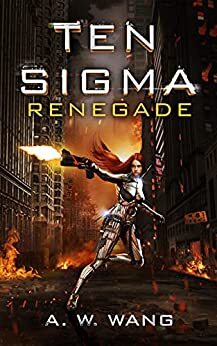
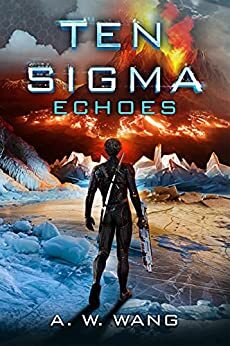
I have already bought the next two books in this series, and I understand there are to be at least three more… so if you’re a fan of longer series, you definitely need to get started!
DiscussionHow do you feel about violence in novels? I’m pretty hard to shake, but I don’t go out of my way to read gory books. I much prefer to be scared/grossed out by my own imagination. One book that I read recently that really stuck with me was Gone World by Tom Sweterlitsch. It was also brutal, and yet… I could not look away…
Hit me with some sci-fi horror suggestions!
December 3, 2021
Indie Feature Friday: SF Book Review – Galaxy Cruise: The Maiden Voyage by Marcus Alexander Hart

Happy Friday!
I can’t believe it’s December already.
I’m in a cozy reads mood right now. I’m all bundled up with blankets and tea or hot chocolate and big fuzzy socks, even though this year hasn’t been as cold here as usual. It’s full-on hibernation time here, for which I like fun, funny, and heartwarming books (sometimes with the occasional murder)
If you’re looking for a last minute gift for a Sci-Fi lover on your list, or you’re just wanting some suggestions for great books to curl up with this holiday season, I have the series for you!
Galaxy Cruise: The Maiden Voyage by Marcus Alexander Hart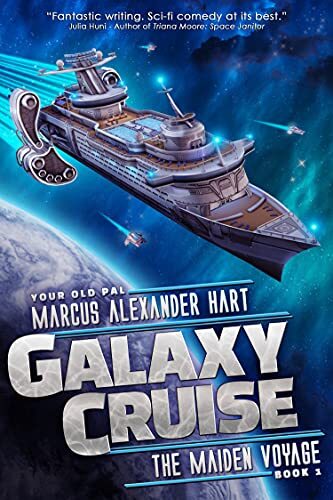 The Blurb:
The Blurb:Humanity needed a hero. It got a karaoke DJ.
Leo MacGavin is not the brightest specimen of humanity. But when he inadvertently rescues a flirty alien heiress, he’s promoted from second-rate lounge entertainer to captain of the galaxy’s most sophisticated cruise ship.
Before he can flee in terror, a human-hating executive gives Leo an ultimatum—complete the vessel’s maiden voyage or mankind’s last colony will be turned into a sewage dump. To make matters worse, a militant cyborg is undermining his authority, a giant spider is terrifying the passengers, and a sentient plant keeps stealing all the beer.
If Leo ever wants to see his home again, he’ll have to keep the guests happy through seven days of onboard antics and madcap shore excursions. As strange malfunctions tear the ship apart, can he hold his rag-tag crew together, or will he flush the last bastion of humanity down the crapper?
Galaxy Cruise: The Maiden Voyage is a hilarious science fiction comedy adventure for readers who love The Hitchhiker’s Guide to the Galaxy and Space Team. And moviegoers who love Galaxy Quest, Spaceballs, and Guardians of the Galaxy. And TV watchers who love Red Dwarf, Futurama, and The Orville. And people who basically just want to see The Love Boat on a spaceship.
Don’t get left on the spacedock! Grab this silly, madcap space caper now!
My Review:Oh, Galaxy Cruise. How do I love you? Let me count the ways…
Okay, no. I’m not going to torture you with poetry.
But this book ticked so many boxes for me that I do feel slightly compelled to break into rhyming couplets.
I’m going to be honest with you. Sci-Fi Comedy is a really tough genre to impress me in. I love it when it’s done well, but humour is tricky. A tiny misstep and a joke goes from funny to WTF faster than a Cowboy Bebop fan can spew unmitigated wrath at anyone who dares to say they’re enjoying the Netflix adaptation.
Humour is a deeply personal thing, and what resonates with one reader/viewer will not necessarily tickle the funny bone of the person next to them.
And that’s okay. That’s cool. That’s what makes the world go round.
But I’ve recently read a lot of Sci-Fi Comedy books that just… didn’t do it for me. (I’m looking at you A Robot Named Clunk)
So Galaxy Cruise was such a glorious find I immediately bought Book 2 and pre-ordered Book 3 when I finished Book 1: The Maiden Voyage.
I’ve read one of Hart’s books before, so I was pretty confident that I’d enjoy this one. You can read my review of his fabulously irreverent urban fantasy novel Alexis vs. the Afterlife here!
Marcus Alexander Hart is a superb storyteller. His plots follow a tried and true structure similar to the storytelling style of Disney/Pixar films. There’s a familiarity and a trust involved in this kind of perfectly plotted book, the kind that can destroy a reading experience if the author fumbles the readers expectations. Hart does not disappoint.
Galaxy Cruise balances this familiar structure with a completely zany cast of characters, an outlandish situation, and more problems that you can shake a Karaoke mic at. I was entertained the entire time I was reading, and while I was right about some of my predictions I was still surprised by the resolution of this first book. There were twists and turns I didn’t see coming, and I was left with the immediate need to jump into Book 2!
Hart’s characters are his greatest asset, and I love that both books of his I’ve read have featured queer female characters. But what I have come to appreciate the most about his work after reading a few comedic flops is this: Hart is a master of his authorial voice.
When I read Space Opera by Catherynne M. Valente I was struck by a sense of her really trying to channel Douglas Adams. She did a good job, and the book is laugh out loud funny at times, but it was exhausting to get through sometimes.
A Robot Named Clunk suffered from the same feeling of soulless imitation. All the right parts were there, except the tin man had no heart.
Even Bob’s Saucer Repair by Jerry Boyd, which I enjoyed for other reasons, lacked the strength and confidence of Marcus Alexander Hart’s voice in Galaxy Cruise: The Maiden Voyage.
That voice is why I will read everything Hart puts out. He’s an indie author that truly raises the bar for other indie authors and easily competes with traditionally published science fiction.
The Technical Details:There are a lot of great indie books out there, and they come in various stages of professionalism.
The cost involved in producing a book independently can mean that a book doesn’t have the best cover or it doesn’t get that second or third round of proofreading.
Then there are books like Galaxy Cruise which you could put in front of any discerning reader and they would never guess that it was self-published.
I do not personally believe that a book without typos is necessarily indicative of a professionally written story. I’m willing to overlook some errors of the sake of a book I’m emotionally invested in.
But Galaxy Cruise goes to prove that a stellar story combined with a professional cover, editing, formatting, and proofreading really does improve the reader experience.
It’s a knock-out, through and through.
DiscussionWhat’s your favourite Sci-Fi Comedy movie or novel? Have you read any of Hart’s work? Let me know in the comments!



